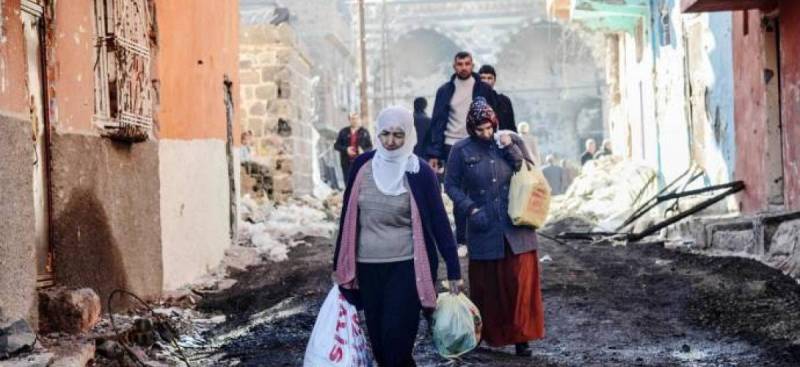In the heart of Diyarbakır, the largest city in Turkey’s predominantly Kurdish southeast, lies the ancient district of Sur. The fortress encircling the district, and the gardens just beyond the walls, are a UNESCO World Heritage Site, while over 1,500 buildings in Sur have been labelled historic and are protected by law.
In late 2015, however, the Turkish military entered with tanks and troops to root out Kurdish militants, which led to widespread destruction of buildings and displacement of residents. The authorities followed up with curfews and a vast reconstruction plan.
After months of quarantine, I was in Sur again last week. I met with the muhtar, head of the district, first. The crowd on the main streets fades as we enter side streets. A few people are seen in the narrow parts of Sur. Children are playing in puddles on the streets.
I was walking with the muhtar and talking about the district’s needs. At that moment, a woman who saw us passing came out of her house and shouted fiercely: “Muhtar, solve the drug issue!”
Then I learned that the previous night a flashbang had gone off in the neighbourhood.
Drug use and prostitution have become widespread in Sur’s empty houses and someone had attacked one of these places with a flashbang to chase away the people inside.
“Drug use has become widespread, we do not know what to do,” the muhtar said.
People are nervous and there has been a large-scale migration out of Sur. The number of households living in each neighbourhood in the district has decreased by half in the last four to five years.
After calming the woman, we continued to Alipaşa – another historic neighbourhood that no longer exists. The construction of strange villas in the area – part of the urban transformation to replace properties damaged or destroyed three years ago from the fighting – is now finished.
The villas are separated from the poor part of Sur by steel barriers. Next to the barriers, there is a family living in a tent that I have known for a long time. “You are still here?” I said.
“I will not go anywhere until they give me back my house,” the man said, and swore. His little son played with a plastic truck next to the barriers, oblivious to anything else.
I learned that the social services directorate has provided bread and food aid during the coronavirus pandemic. “Nurcan, you know I have been the muhtar here for more than 20 years, those who seek help apply to us. Before, only women or children would come to us. For the first time, men are coming too this year, asking for help. The situation is really bad,” the muhtar said.
Despite the beautiful, promising graffiti on the walls and new cafes that open every day, a terrible poverty can be felt in Sur. This poverty is accompanied by great despair.
I went to another neighbourhood, Melikahmet. I stopped by the coppersmiths, I was their first customer of the day. From there, I went to the spice shop. More than half of the shops are open, but they are generally empty – there are no customers.
I went to the carpet seller that I have known for years. He also complained about the rise in drug use.
“We have let the problems happen by ignoring them for many years. Now, things go unsolved by saying that it is ‘not the time’,” he said.
Going to Sur now gives me a great sorrow. The beautiful narrow streets where I grew up are empty. Sur is hurt, Sur is alone, Sur is abandoned.
Then, I went to the street where I watched a blocked-off area secretly without leaving Sur. I sat on a rock. I looked at the destroyed district once again. A woman came, and she crouched on the stone next to me. Obviously, her heart hurt. “I lost hope,” she said.
“This war and destruction lasted so long, and now hope is gone.”
